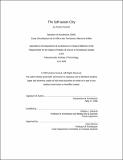| dc.contributor.advisor | William J. Mitchell. | en_US |
| dc.contributor.author | Sevtsuk, Andres | en_US |
| dc.contributor.other | Massachusetts Institute of Technology. Dept. of Architecture. | en_US |
| dc.date.accessioned | 2007-05-16T15:21:56Z | |
| dc.date.available | 2007-05-16T15:21:56Z | |
| dc.date.copyright | 2006 | en_US |
| dc.date.issued | 2006 | en_US |
| dc.identifier.uri | http://dspace.mit.edu/handle/1721.1/35128 | en_US |
| dc.identifier.uri | http://hdl.handle.net/1721.1/35128 | |
| dc.description | Thesis (S.M.)--Massachusetts Institute of Technology, Dept. of Architecture, 2006. | en_US |
| dc.description | This electronic version was submitted by the student author. The certified thesis is available in the Institute Archives and Special Collections. | en_US |
| dc.description | Includes bibliographical references (p. 123-126). | en_US |
| dc.description.abstract | This thesis explores the idea of real-time urban space management. While increasing amounts of real-time information about the city, specifically the location of people and resources, appear, it becomes necessary to explore how different strategies of distributing real-time location information can be used as urban design tools for a more sustainable resource allocation. I focus on the study of street-parking, a system that clearly has a market situation with demand and supply, but due to lack of information is poorly managed today. I argue that an equilibrium state of the parking market in popular areas, similar to many other urban space markets, is a frequent over demand. The important challenges are therefore allocation optimization and queuing management. I propose five different strategies of using real-time location information to reduce search times and analyze the system through computer simulations and logic. Borrowing ideas from Game Theory, I try to illustrate how collaborative behavior between drivers could yield most efficient results from both the individual and the group point of view. Lastly, I outline some challenges that the use of real-time information systems introduce to the realm of urban design in general. | en_US |
| dc.description.statementofresponsibility | by Andres Sevtsuk. | en_US |
| dc.format.extent | 164 p. | en_US |
| dc.language.iso | eng | en_US |
| dc.publisher | Massachusetts Institute of Technology | en_US |
| dc.rights | M.I.T. theses are protected by copyright. They may be viewed from this source for any purpose, but reproduction or distribution in any format is prohibited without written permission. See provided URL for inquiries about permission. | en_US |
| dc.rights.uri | http://dspace.mit.edu/handle/1721.1/35128 | en_US |
| dc.rights.uri | http://dspace.mit.edu/handle/1721.1/7582 | |
| dc.subject | Architecture. | en_US |
| dc.title | The self-aware city | en_US |
| dc.type | Thesis | en_US |
| dc.description.degree | S.M. | en_US |
| dc.contributor.department | Massachusetts Institute of Technology. Department of Architecture | |
| dc.identifier.oclc | 71791620 | en_US |
